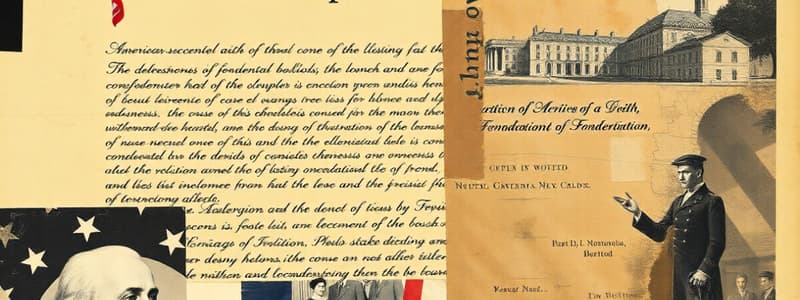Podcast
Questions and Answers
What was a major concern of the Anti-Federalists regarding the Constitution?
What was a major concern of the Anti-Federalists regarding the Constitution?
- The lack of a strong central government.
- The absence of a bill of rights to protect individual liberties. (correct)
- The potential for the government to become too democratic.
- The power granted to the states in relation to the federal government.
Why was the ratification of the Constitution by Virginia and New York particularly significant?
Why was the ratification of the Constitution by Virginia and New York particularly significant?
- They were the only states that had not already ratified the Constitution.
- They represented the interests of the Southern and Northern states respectively.
- They were the two largest and most influential states at the time. (correct)
- Their ratification ensured the support of the majority of the population.
What was the primary purpose of the Federalist Papers?
What was the primary purpose of the Federalist Papers?
- To explain the process of amending the Constitution.
- To persuade people to support the new Constitution. (correct)
- To establish a system of checks and balances in government.
- To outline the fundamental principles of democracy.
What was the primary reason for the difficulty in changing the Articles of Confederation?
What was the primary reason for the difficulty in changing the Articles of Confederation?
Why were the first ten amendments to the Constitution, known as the Bill of Rights, added after the Constitution was already ratified?
Why were the first ten amendments to the Constitution, known as the Bill of Rights, added after the Constitution was already ratified?
Which of the following factors contributed to colonists' growing discontent with British rule?
Which of the following factors contributed to colonists' growing discontent with British rule?
What significant event marked the beginning of American independence from Great Britain?
What significant event marked the beginning of American independence from Great Britain?
What was the primary concern of the drafters of the Articles of Confederation in terms of national government?
What was the primary concern of the drafters of the Articles of Confederation in terms of national government?
Under the Articles of Confederation, the national government had limited power. Which of the following was specifically NOT a power granted to the national government under the Articles?
Under the Articles of Confederation, the national government had limited power. Which of the following was specifically NOT a power granted to the national government under the Articles?
What key weakness of the Articles of Confederation ultimately led to the Constitutional Convention?
What key weakness of the Articles of Confederation ultimately led to the Constitutional Convention?
What key change did the Constitution bring to the structure of the national government compared to the Articles of Confederation?
What key change did the Constitution bring to the structure of the national government compared to the Articles of Confederation?
How did the concept of the social contract influence the colonists' actions during the Pre-Revolutionary period?
How did the concept of the social contract influence the colonists' actions during the Pre-Revolutionary period?
What was the primary reason the colonists believed that the British government had broken the social contract?
What was the primary reason the colonists believed that the British government had broken the social contract?
Flashcards
Separation of Powers
Separation of Powers
A system where power is divided between different branches of government to prevent one branch from becoming too powerful.
Checks and Balances
Checks and Balances
A system where each branch of government can limit the power of the other branches, preventing tyranny.
Bill of Rights
Bill of Rights
A formal document listing basic rights and freedoms that protect citizens from government overreach.
Federalists
Federalists
Signup and view all the flashcards
Anti-Federalists
Anti-Federalists
Signup and view all the flashcards
Social Contract
Social Contract
Signup and view all the flashcards
English Liberties
English Liberties
Signup and view all the flashcards
Natural Rights
Natural Rights
Signup and view all the flashcards
Confederation
Confederation
Signup and view all the flashcards
Articles of Confederation
Articles of Confederation
Signup and view all the flashcards
Federal System
Federal System
Signup and view all the flashcards
Republic
Republic
Signup and view all the flashcards
Bicameral Legislature
Bicameral Legislature
Signup and view all the flashcards
Study Notes
2.1 The Pre-Revolutionary Period and the Roots of the American Political Tradition
- Colonists initially accepted British rule, valuing their English liberties and limited government traditions.
- Discontent arose when perceived abuses of these liberties occurred, such as the Proclamation of 1763, the trial of smugglers, and taxation without consent.
- Colonists viewed life, liberty, and property as natural rights, not gifts from the monarch.
- The Second Continental Congress declared independence from Great Britain in 1776.
2.2 The Articles of Confederation
- The drafters of the Articles of Confederation sought to limit national government power, fearing tyranny.
- States retained significant power to govern their residents, and the national government was limited to declaring war, coining money, and conducting foreign affairs.
- The national government lacked the power to tax, regulate commerce, or maintain a strong military, hindering its ability to defend the nation or repay debts.
2.3 The Development of the Constitution
- The inadequacies of the Articles of Confederation spurred delegates to meet in Philadelphia in 1787 to draft a new constitution.
- This new governing document established a republic with a strengthened national government.
- Congress became bicameral, and a national judicial system was created, marking the establishment of a federal system with governing power over the entire nation.
2.4 The Ratification of the Constitution
- Anti-Federalists opposed the increased power granted to the federal government under the Constitution and desired greater protection of individual liberties via a Bill of Rights.
- Federalists argued for a strong national government, emphasizing that the document would address concerns with a Bill of Rights.
- New Hampshire was the ninth state to ratify the Constitution in June 1788, making it the law of the land. Virginia and New York followed soon after.
2.5 Constitutional Change
- The Articles of Confederation were difficult to amend.
- The Constitution established a process for amending the document, requiring a two-thirds majority in Congress and three-quarters of state legislatures.
- The Bill of Rights, safeguarding individual liberties, was subsequently added as the first ten amendments to the Constitution in 1791.
- Subsequent amendments addressed important issues like ending slavery, granting citizenship to African Americans, and affording voting rights to all Americans regardless of race, color, or sex.
Studying That Suits You
Use AI to generate personalized quizzes and flashcards to suit your learning preferences.




